Related Research Articles

Charles Bannister (1738–1804) was an English actor, comedian and singer.
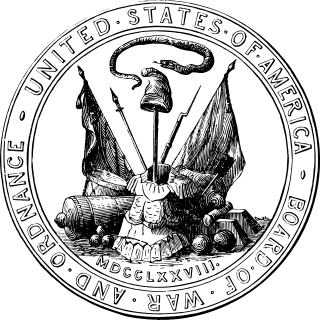
The Continental Army was the army of the United Colonies representing the Thirteen Colonies and later the United States during the American Revolutionary War. It was formed on June 14, 1775, by a resolution passed by the Second Continental Congress, meeting in Philadelphia after the war's outbreak. The Continental Army was created to coordinate military efforts of the colonies in the war against the British, who sought to maintain control over the American colonies. General George Washington was appointed commander-in-chief of the Continental Army and maintained this position throughout the war.
The history of opera in the English language commences in the 17th century.
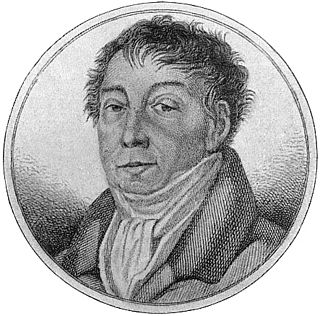
Luigi Marchesi was an Italian castrato singer, one of the most prominent and charismatic to appear in Europe during the second half of the eighteenth century. His singing was praised by the likes of Mozart and Napoleon.
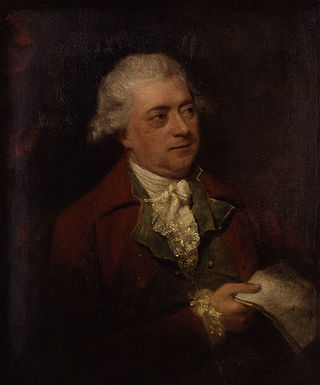
John O'Keeffe was an Irish actor and dramatist. He wrote a number of farces, amusing dramatic pieces and librettos for pasticcio operas, many of which had great success. Among these are Tony Lumpkin in Town (1778), Love in a Camp (1786), and Omai (1785), an account of the voyages of the Tahitian explorer Omai, and Wild Oats (1791).

The 1st Rhode Island Regiment was a regiment in the Continental Army raised in Rhode Island during the American Revolutionary War (1775–83). It was one of the few units in the Continental Army to serve through the entire war, from the siege of Boston to the disbanding of the Continental Army on November 3, 1783.
The Loves of Mars and Venus by John Weaver was arguably the first modern ballet, the first dance work to tell a story through dance, gesture and music alone. Its first performance was at London's Drury Lane Theatre on Saturday 2 March 1717.
Russian opera is the art of opera in Russia. Operas by composers of Russian origin, written or staged outside of Russia, also belong to this category, as well as the operas of foreign composers written or intended for the Russian scene. These are not only Russian-language operas. There are examples of Russian operas written in French, English, Italian, Latin, Ancient Greek, Japanese, or the multitude of languages of the nationalities that were part of the Empire and the Soviet Union.

W. H. Denny was an English singer and actor in comic operas, operettas and musical theatre. He is best remembered for his portrayal of baritone roles in the Savoy operas.

Valentino Urbani was an Italian mezzo-soprano or alto castrato who sang for the composer George Frideric Handel in the 18th century. He was known by the stage name Valentini. He sang the role of Eustazio at the première of Handel’s Rinaldo, the role of Silvio at the premiere of Il pastor fido, and the role of Egeo at the first performance of Teseo. His powers of singing seem to have been limited and by the time of his Handel roles his voice was declining but he is reputed to have been a fine actor.
"Oh, whistle and I'll come to you, my lad" is the title and refrain of a poem and song by Robert Burns, first written in 1787, and then expanded in 1793.

Argippo is an opera libretto by Domenico Lalli, which in Giovanni Porta's setting premiered in Venice in 1717. Claudio Nicola Stampa's reworked version of the libretto was set as L'Argippo by Andrea Stefano Fiorè. This opera was performed in Milan in 1722.

The Poor Soldier is a 1783 British pasticcio opera with music by William Shield and a text by John O'Keeffe. It was a comedy set around Irish soldiers returning home after fighting in the British army in the American War of Independence, which formally ended that year with the Peace of Paris. One of the redcoats must fight for the love of Norah with the urbane Captain Fitzroy. The events are set entirely in a small Irish village called Carton, a few miles from Dublin, although several versions refer to it only as "a country village".

Patrick in Prussia, or Love in a Camp is a 1786 comic opera with music by William Shield and a libretto by John O'Keeffe. An afterpiece, it was a sequel to the 1783 hit The Poor Soldier with the characters now serving in the Prussian army.

La villanella rapita is an opera giocosa in two acts by Francesco Bianchi with additional arias by Wolfgang Amadeus Mozart for its later performances in Vienna. The libretto was by Giovanni Bertati.
António Leal Moreira was a Portuguese Classical composer and organist. He composed a large number of operas, most of which were premiered in Lisbon; much of the rest of his output is sacred, though he composed a handful of symphonies as well. One of his works, Sinfonia para a Real Basílica de Mafra, is an organ symphony composed specifically for the 6 organs of Mafra National Palace's Basilica.

William Thomas Lewis (c.1748–1811), known as "Gentleman" Lewis, due to his refined acting style, was an English actor. Raised in Ireland, he made his name on the Dublin stage before moving to the Theatre Royal, Covent Garden in London where he spent many years. He was said to be "the most complete fop on the stage". In later life he went into theatrical management.
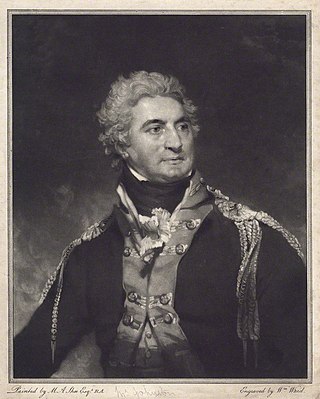
John Henry Johnstone (1749–1828), also known as 'Jack' Johnstone or 'Irish' Johnstone, was an Irish actor, comedian and singer. He was a notable performer of Stage Irishman roles.
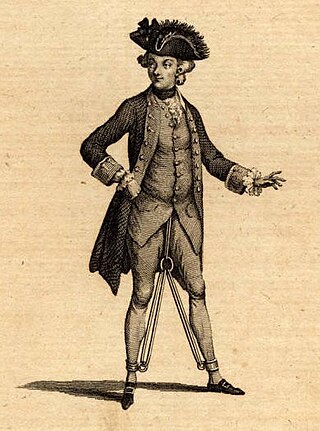
Margaret Kennedy was a contralto singer and actress. She was best known for her performances in male roles, especially in the operas of Thomas Arne.

Ralph Wewitzer (1748–1825) was an English actor. He won critical acclaim in supporting parts, but was never given leading roles. He had a 44-year acting career, and is thought to have learned over 400 speaking parts.
